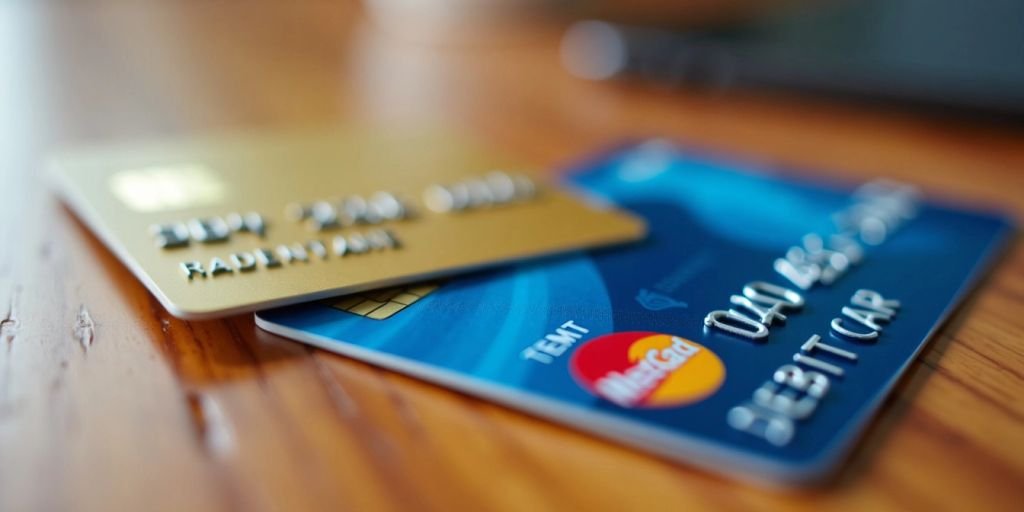When deciding between credit and debit cards, it’s essential to understand how each option works and their respective advantages and disadvantages. This guide will help you navigate these two popular payment methods and make an informed choice that aligns with your financial needs.
Key Takeaways
- Credit cards allow you to borrow money for purchases, while debit cards use your own funds directly.
- Debit cards help you manage your spending better since you can only spend what you have.
- Credit cards can offer rewards and benefits, but they also come with the risk of accumulating debt.
- Security features vary, but both card types provide protection against fraud if used correctly.
- Choosing between credit and debit depends on your spending habits and financial goals.
Understanding Credit Cards
How Credit Cards Work
Credit cards allow you to borrow money from a bank to make purchases. You can buy things even if you don’t have cash in your account. When you use a credit card, you are expected to pay back the bank later, usually at the end of the month. Here’s how it works:
- You make a purchase using your credit card.
- The bank pays the store for you.
- You receive a bill at the end of the month to pay back the bank.
Benefits of Using Credit Cards
Credit cards can be very helpful. Here are some advantages:
- Flexibility: You can buy now and pay later.
- Rewards: Many cards offer points or cash back for purchases.
- Emergency funds: They can help in unexpected situations, like a broken appliance.
| Benefit | Description |
|---|---|
| Flexibility | Buy now, pay later |
| Rewards | Earn points or cash back |
| Emergency funds | Useful for unexpected expenses |
Potential Drawbacks of Credit Cards
While credit cards have benefits, they also have downsides:
- Debt risk: It’s easy to spend more than you can pay back.
- Interest rates: If you don’t pay your bill on time, you may owe extra money.
- Fees: Some cards charge annual fees or late payment fees.
Credit cards can be a great tool, but they require careful management to avoid debt.
In summary, understanding how credit cards work, their benefits, and their drawbacks can help you make better financial choices. Comparing the leading credit cards in the U.S. can also help you find the best option for your needs.
Understanding Debit Cards

How Debit Cards Work
A debit card allows you to access your bank account without needing to withdraw cash. When you use it, the money is taken directly from your account. Just swipe your card and enter your PIN to complete the purchase. This means you can only spend what you have in your account, helping you avoid debt.
Benefits of Using Debit Cards
Using a debit card has several advantages:
- Real-time spend tracking: You see your balance change immediately after a purchase.
- No debt accumulation: Since you’re using your own money, there’s no risk of overspending.
- Overdraft coverage: Some banks offer overdraft protection, allowing you to spend a little more than you have.
Potential Drawbacks of Debit Cards
While debit cards are convenient, they also have some downsides:
- Limited rewards: Unlike credit cards, debit cards often don’t offer rewards like cash back or points.
- Less fraud protection: If your card is lost or stolen, recovering funds can be more difficult compared to credit cards.
- No credit building: Using a debit card doesn’t help you build your credit score, which is important for future loans.
Debit cards are a great tool for managing your money, but it’s essential to be aware of their limitations. Always check your balance before making a purchase to avoid any surprises!
Comparing Fees and Charges
Annual Fees and Maintenance Costs
When choosing between credit and debit cards, one of the first things to consider is the annual fees. Credit cards often come with annual fees that can range from $0 to several hundred dollars, depending on the card’s benefits. In contrast, debit cards typically do not have annual fees, making them a more cost-effective option for many consumers.
Transaction Fees
Both credit and debit cards may incur transaction fees, especially when used internationally. Here’s a quick comparison:
| Type of Card | Transaction Fee |
|---|---|
| Credit Card | 1-3% (varies by card) |
| Debit Card | Usually none, but check with your bank |
Credit cards may also charge foreign transaction fees, while debit cards often do not, making them a better choice for travelers.
Interest Rates and Penalties
Credit cards can have high-interest rates, often exceeding 20% if the balance is not paid in full each month. Here are some key points to remember:
- Late Payment Fees: Credit cards can charge hefty fees for late payments.
- Cash Advance Fees: Using a credit card for cash advances can lead to high fees and interest rates.
- Debit Cards: Since you are using your own money, there are no interest charges or penalties for late payments.
In summary, understanding the fees associated with each card type can help you make a more informed decision about which option is best for your financial situation.
Conclusion
When comparing fees and charges, debit cards generally offer lower costs and fewer surprises. However, credit cards can provide benefits that may outweigh their fees for some users. Always read the fine print and assess your spending habits before making a choice.
Security and Fraud Protection

Credit Card Security Features
Credit cards come with several security features to protect users from fraud. These include:
- Chip technology: This makes it harder for thieves to clone your card.
- Fraud alerts: Many banks notify you of suspicious activity.
- Zero liability policy: You won’t be responsible for unauthorized charges if you report them promptly.
Debit Card Security Features
Debit cards also have security measures, but they can be less robust than credit cards. Key features include:
- PIN protection: You need a Personal Identification Number to use your card.
- Transaction limits: Some banks limit how much you can spend in a day.
- Fraud monitoring: Banks often monitor transactions for unusual activity.
Steps to Protect Your Card Information
To keep your card information safe, follow these steps:
- Monitor your accounts regularly: Check for unauthorized transactions.
- Use secure websites: When shopping online, ensure the site is secure.
- Alert your card issuer: If you notice any suspicious activity, contact your bank immediately. This is crucial to protect yourself from debit card fraud.
Always be vigilant about your spending habits. With the right precautions, you can enjoy the benefits of both credit and debit cards without falling victim to fraud.
Impact on Credit Score
How Credit Cards Affect Your Credit Score
Credit cards can significantly influence your credit score. When you use a credit card, the bank reports your payment history to credit bureaus. This means that:
- Timely payments can boost your score.
- High credit utilization (using a lot of your available credit) can lower it.
- Opening new credit accounts can temporarily decrease your score.
How Debit Cards Affect Your Credit Score
Debit cards, on the other hand, do not affect your credit score because they are linked directly to your bank account. They do not involve borrowing money, so:
- No impact on your credit score.
- Good for managing spending without accumulating debt.
- Can help you avoid overspending.
Tips for Managing Your Credit Score
To maintain a healthy credit score, consider these tips:
- Pay your bills on time to avoid late fees and negative reports.
- Keep your credit utilization below 30% of your total limit.
- Regularly check your credit report for errors and dispute them if necessary.
Managing your credit score is essential for financial health. A good score can lead to better loan terms and lower interest rates.
| Factor | Credit Cards Impact | Debit Cards Impact |
|---|---|---|
| Payment History | Yes | No |
| Credit Utilization | Yes | No |
| New Credit Accounts | Yes | No |
Choosing the Right Option for You
When deciding between a credit card and a debit card, it’s important to consider your personal financial situation and habits. Understanding your needs can help you make the best choice.
Assessing Your Spending Habits
- Daily Purchases: For everyday items, a debit card is often better as it helps you keep track of your spending.
- Larger Expenses: If you need to buy something expensive, a credit card can allow you to pay over time.
- Rewards and Points: If you want to earn rewards, credit cards usually offer better benefits.
Considering Your Financial Goals
- Budgeting: Think about how each card fits into your budget. Debit cards help you spend only what you have.
- Building Credit: If you want to improve your credit score, using a credit card responsibly is key.
- Emergency Funds: Consider if you need a credit card for unexpected expenses.
Evaluating Your Risk Tolerance
- Debt Management: If you struggle with debt, a debit card might be safer as it uses your own money.
- Spending Control: Debit cards can help you avoid overspending since you can only use what you have.
- Financial Discipline: If you are disciplined with payments, a credit card can be a useful tool.
Choosing the right card is about understanding your financial habits and goals. Make sure to evaluate your options carefully to avoid unnecessary fees and debt.
In summary, both cards have their advantages and disadvantages. By assessing your spending habits, financial goals, and risk tolerance, you can make an informed decision that suits your lifestyle. Remember, when using a prepaid card, you can choose either option to pay, which affects how the payment is processed and may also impact the fee you’re charged.
Final Thoughts
In conclusion, choosing between a credit card and a debit card depends on your personal needs and spending habits. Debit cards are great for daily purchases because they help you keep track of your spending and avoid debt. You only spend what you have, which makes it easier to manage your money. On the other hand, credit cards can be useful for larger purchases or when you want to earn rewards like points or cash back. However, they can lead to overspending if you’re not careful. Ultimately, it’s important to think about your financial situation and choose the option that works best for you.
Frequently Asked Questions
How does a credit card work?
A credit card allows you to borrow money from a bank to make purchases. You pay back the bank later, usually at the end of the month.
What are the benefits of using a debit card?
Debit cards let you spend money directly from your bank account without needing cash. They help you keep track of your spending.
Are there fees associated with credit cards?
Yes, credit cards may have annual fees, late payment fees, and interest charges if you don’t pay your bill on time.
Is it safer to use a credit card or a debit card?
Credit cards often offer better fraud protection. If someone uses your credit card without permission, you may not have to pay.
How can I improve my credit score?
To improve your credit score, pay your bills on time, keep your credit card balances low, and check your credit report regularly.
Which card is better for everyday purchases?
For daily spending, many people prefer debit cards because they help you stick to your budget and avoid debt.




